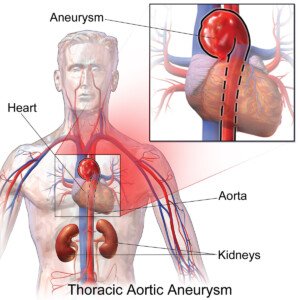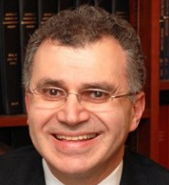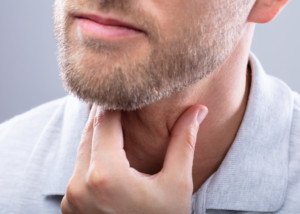
Chest and back pain along with a hoarse voice can be caused by one of two life-threatening medical conditions.
The expert source for this article about the causes of a hoarse voice with chest and back pain is John A. Elefteriades, MD, William W.L. Glenn Professor of Surgery, and Director, Aortic Institute at Yale-New Haven, New Haven, CT.
Waste no time seeing a cardiologist if you have all three:
Chest pain
Back pain
And a hoarse voice.
They may very well be all connected, though not necessarily.
“Hoarse voice usually arises from vocal problems, either infection, overuse, or polyps or tumors,” says Dr. Elefteriades.
So if a hoarse voice is being caused by an infection or polyp, for example, and you also have chest and back pain that has seemingly coincided with the hoarse voice…then there’s at least two underlying causes, since a polyp or an infection of the vocal cords will not cause chest or back pain.
However, Dr. Elefteriades continues: “In some cases, hoarseness may be due to an aneurysm in the aortic arch or the descending aorta.”
The aorta is the body’s largest blood vessel, originating in the heart and supplying the body with blood.
An aneurysm is an abnormally enlarged or dilated section of a blood vessel.
The bigger an aneurysm gets, the higher the risk of it tearing, dissecting or bursting.

Source: BruceBlaus/CreativeCommons
A person can be dead within minutes from the massive internal bleeding that results.
“The recurrent laryngeal nerve runs right over the site where the aortic arch joins the descending aorta,” says Dr. Elefteriades.
“So, if there is severe aneurysmal dilatation of the aorta, the recurrent laryngeal nerve can be stretched — to the point where it stops working.
“When it stops working, the vocal cord on that side becomes immobile, leading to severe hoarseness.
“The accompanying aneurysm can produce chest or back pain from pressure on the chest wall by its very size.”
If a doctor suspects that this is what’s going on, he will order an image of the aorta, likely using MRI technology.
An aortic aneurysm that causes symptoms is one of the criteria for surgical repair.

Formerly the chief of cardiothoracic surgery at Yale University and Yale New-Haven Hospital, Dr. Elefteriades is working on identifying the genetic mutations responsible for thoracic aortic aneurysms. He is the author of over 400 scientific publications on a wide range of cardiac and thoracic topics.
 Lorra Garrick is a former personal trainer certified by the American Council on Exercise. At Bally Total Fitness she trained clients of all ages for fat loss, muscle building, fitness and improved health.
Lorra Garrick is a former personal trainer certified by the American Council on Exercise. At Bally Total Fitness she trained clients of all ages for fat loss, muscle building, fitness and improved health.









































